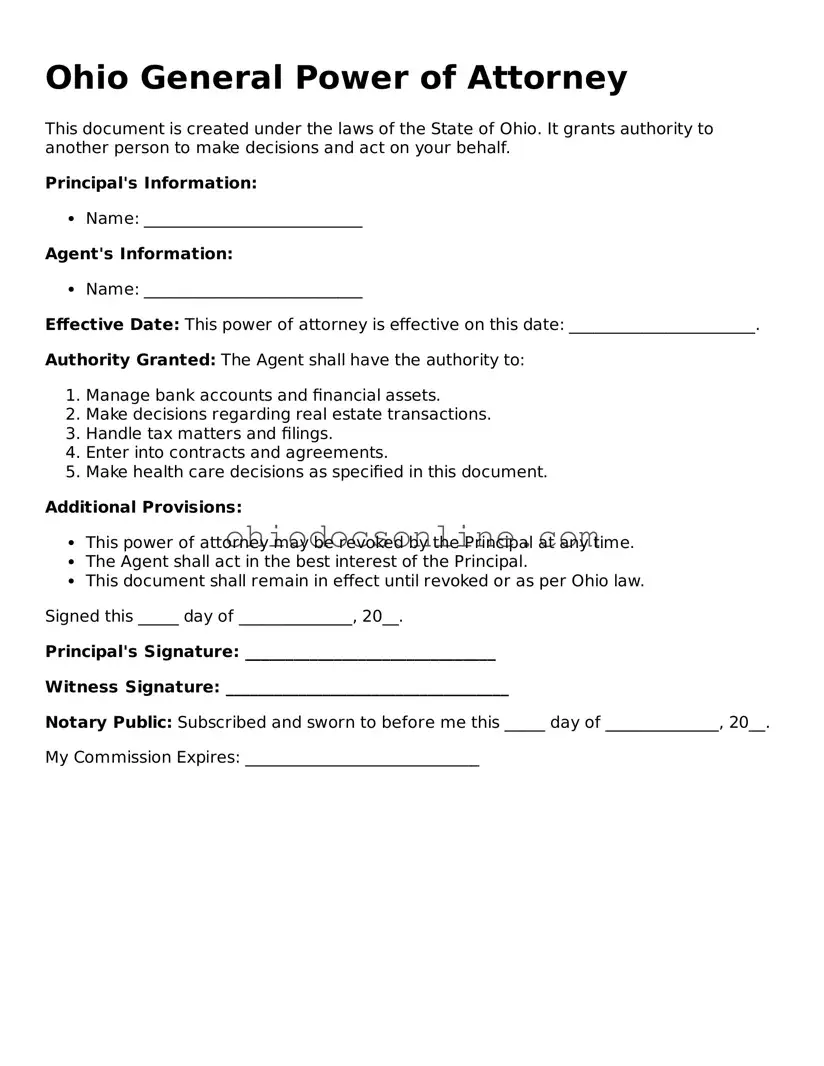Printable General Power of Attorney Template for Ohio
Documents used along the form
When creating a General Power of Attorney in Ohio, it is often beneficial to consider additional forms and documents that can complement this important legal tool. Each of these documents serves a unique purpose and can help ensure that your wishes are honored and your affairs are managed according to your preferences.
- Durable Power of Attorney: This document is similar to a General Power of Attorney but remains effective even if you become incapacitated. It allows your chosen agent to make decisions on your behalf during times when you are unable to do so.
- Health Care Power of Attorney: This form designates someone to make medical decisions for you if you are unable to communicate your wishes. It ensures that your health care preferences are respected and followed.
- Living Will: A Living Will outlines your wishes regarding medical treatment in the event that you become terminally ill or are in a persistent vegetative state. It provides guidance to your family and medical providers about your desires for end-of-life care.
- Financial Power of Attorney: This document gives your agent authority to manage your financial affairs, such as paying bills, managing investments, and handling real estate transactions. It can be tailored to suit your specific financial needs.
- Revocation of Power of Attorney: If you ever need to cancel or change a previously granted Power of Attorney, this document formally revokes the authority you granted. It is essential to notify all relevant parties once a revocation is made.
Considering these documents alongside your Ohio General Power of Attorney can provide peace of mind and clarity. Each serves a vital role in ensuring your wishes are carried out and that your loved ones understand your preferences during critical times.
Dos and Don'ts
When filling out the Ohio General Power of Attorney form, it is important to follow certain guidelines to ensure the document is valid and meets your needs. Below is a list of things to do and avoid.
- Do clearly identify the principal and agent by full name.
- Do specify the powers granted to the agent in detail.
- Do sign the form in the presence of a notary public.
- Do keep a copy of the completed form for your records.
- Don't leave any sections blank that are required.
- Don't use vague language when describing the powers.
- Don't sign the form without understanding the implications.
- Don't forget to inform your agent about their responsibilities.
Key takeaways
When considering the Ohio General Power of Attorney form, there are several important aspects to keep in mind. Understanding these key points can help ensure that the form is filled out correctly and used effectively.
- Authority Granted: The General Power of Attorney allows you to appoint someone to act on your behalf in various financial and legal matters. It is essential to clearly specify the powers you wish to grant.
- Durability: A General Power of Attorney can be made durable, meaning it remains in effect even if you become incapacitated. This feature is crucial for long-term planning.
- Choosing an Agent: Selecting a trustworthy agent is vital. This person will have significant control over your financial decisions, so choose someone who understands your wishes and will act in your best interest.
- Revocation: You have the right to revoke the General Power of Attorney at any time, provided you are mentally competent. This can be done by creating a written notice of revocation.
- Legal Advice: While the form is straightforward, consulting with a legal professional can provide clarity on specific powers and ensure that the document meets your needs and complies with Ohio law.
Other Ohio Templates
Transfer on Death Deed Ohio - This deed is often used for real estate but may also apply to other types of property in certain jurisdictions.
Free Durable Power of Attorney Form Ohio - The document may include provisions for both financial and healthcare decisions.
Similar forms
- Durable Power of Attorney: This document allows someone to make decisions on your behalf, even if you become incapacitated. Unlike a standard power of attorney, it remains effective even if you lose the ability to make decisions.
- Health Care Proxy: This form designates a person to make medical decisions for you if you are unable to do so. It focuses specifically on health care choices, rather than financial or legal matters.
- Financial Power of Attorney: Similar to a general power of attorney, this document specifically grants authority to handle financial matters, such as banking and real estate transactions. It can be limited to specific tasks or more general in nature.
- Living Will: While not a power of attorney, a living will outlines your preferences for medical treatment in situations where you cannot express your wishes. It works alongside a health care proxy to ensure your desires are honored.
- Trust Agreement: This document establishes a trust, allowing a trustee to manage assets on behalf of beneficiaries. Like a power of attorney, it involves delegating authority, but it focuses on asset management rather than decision-making authority.
